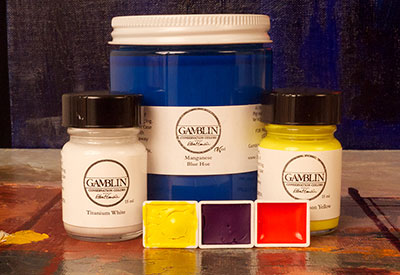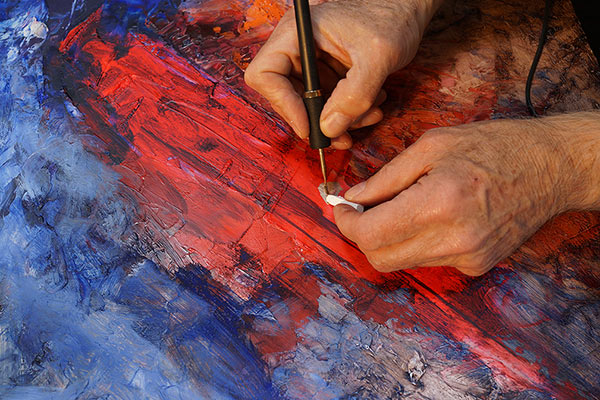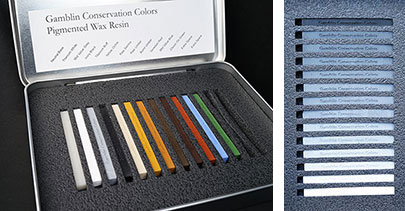Conservation colors

Conservation Colors for the 21st Century Gamblin Conservation Colors are stable, reversible and suitable for use with a wide array of painting styles and techniques. Their innovative low molecular weight resin binder also makes Gamblin Conservation Colors safer to use for the conservator. Robert Gamblin has formulated artists’ painting materials since 1980. In 1994 Robert joined the team of Rene’ de la Rie, Mark Leonard, and Jill Whitten who were working on criteria for a new kind of conservation color which included: stability, safety of use, quality of manufacture, with excellent optical and working properties. Conservation colors made from a low molecular weight resin binder have better optical properties and better handling properties than paints based on polymeric resin. Aldehyde resins are a more appropriate binder than some other low molecular weight resins because they are slightly polar and they wet pigments more easily. At the conclusion of the research project in 2000, Gamblin Conservation Colors became available to conservators all over the world. Primary Qualities of Gamblin Conservation Colors Stable Resin – Draw downs have been aged 3000 hours in a weatherometer (equal to approximately 62 years of museum light exposure). The samples retained their solubility in mild solvents, showing that the resin is stable upon aging. Fully saturated color – the high refractive index of the resin leads to colors as saturated as aged oil colors. Low solvent requirements – Because the aldehyde resin is soluble in solvents of low polarity, you can greatly lower your exposure to strong solvents while retouching paintings. If at any time in the future it is necessary to remove the color it will redissolve in mild solvents, to help protect the original work. All colors lightfast – only pigments of highest lightfastness are used (including modern substitutes for Alizarin Crimson, Indian Yellow, Sap Green, Van Dyke Brown, and Brown Madder) Excellent working properties – we have applied our 30+ years of artist paint manufacturing experience to these colors so that their working properties facilitate your work of retouching rather than make it more difficult. Convenient size – most colors are available in 15 ml jars and ½ pans. What makes Gamblin Conservation Colors unique? In the world of art conservation today, there are three important considerations regarding the materials used on artwork. First, the materials used for this work should be stable – meaning that the materials should not change over time. Second, the materials should be reversible and able to be removed without damaging the original artwork. And third, the binder of the material should visually saturate the pigment in a similar manner as linseed oil. In the mid-90's, Robert Gamblin collaborated with a group of conservators to improve upon these considerations. Gamblin Conservation Colors were born from this collaboration. They include 50 lightfast colors - made with pigments found in our Artist's Grade and 1980 oils and bound in a contemporary resin binder, which makes the restorations stable and reversible.

Gamblin Pigmented Wax / Resin For the conservation of paintings Pigmented Wax/Resin (PWR) is ideal for filling losses in paintings. The material is easy to manipulate using moderately heated tools to quickly fill losses. The texture of canvas weave and paint can be impressed into the material to match the adjacent surface, or the fill can be sculpted to match adjacent brushwork. Cracks and other physical irregularities of an aged painting are easily replicated using dental tools. Since the PWR fill is placed in the loss area only, there is no residue on the surrounding paint. This eliminates the possibility of ghosting in dark passages which can occur using other methods. Choosing from our 12 colors to match the paint or underpainting will facilitate inpainting. Find the set of 12 colors here.

Gamblin Pigmented Wax Resin Stick Set For the conservation of paintings Pigmented Wax/Resin (PWR) is ideal for filling losses in paintings. The material is easy to manipulate using moderately heated tools to quickly fill losses. The texture of canvas weave and paint can be impressed into the material to match the adjacent surface, or the fill can be sculpted to match adjacent brushwork. Cracks and other physical irregularities of an aged painting are easily replicated using dental tools. Since the PWR fill is placed in the loss area only, there is no residue on the surrounding paint. This eliminates the possibility of ghosting in dark passages which can occur using other methods. Choosing from our 12 colors to match the paint or underpainting will facilitate inpainting. Find the 12 individual colors here.
